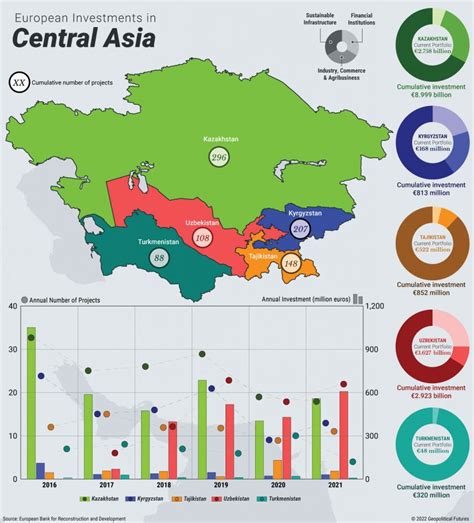The European Union’s engagement with Central Asia goes beyond mere economic interests; it’s a strategic move that aims to foster cooperation, stability, and development in the region. Let’s delve into how the EU is working to strengthen trade and investment ties with the countries of Central Asia.
Understanding the Context
Central Asia, comprising Kazakhstan, Kyrgyzstan, Tajikistan, Turkmenistan, and Uzbekistan, holds significant geopolitical importance due to its vast energy resources, transit routes, and emerging markets. As these nations transition from being post-Soviet states to independent entities seeking global partnerships, the EU sees an opportunity for collaboration.
The EU’s Approach
The EU has adopted a multifaceted approach towards Central Asia that includes political dialogue, economic cooperation, and support for sustainable development. One of the primary goals is to enhance trade relations by negotiating comprehensive agreements that facilitate market access and regulatory alignment.
Trade Agreements
In recent years, the EU has concluded or initiated negotiations on Enhanced Partnership and Cooperation Agreements (EPCAs) with several Central Asian countries. These agreements cover various areas such as trade facilitation, intellectual property rights protection, investment promotion, and sustainable development.
Investment Promotion
Investment flows between the EU and Central Asia have been growing steadily. The EU supports investment promotion activities in sectors like renewable energy, agriculture, infrastructure development, and digital economy. By encouraging private sector involvement through initiatives like the European Bank for Reconstruction and Development (EBRD), the EU aims to boost economic growth in the region.
Challenges and Opportunities
Despite progress in deepening ties between the EU and Central Asia, challenges persist. Issues such as non-tariff barriers to trade, legal harmonization complexities, corruption risks, and security concerns pose obstacles to closer cooperation. However,
these challenges present opportunities for both sides to engage in constructive dialogue aimed at finding mutually beneficial solutions.
Expert Insights
According to trade analysts specializing in Eurasian affairs,”The EU’s engagement with Central Asia is essential not only for economic reasons but also for promoting democratic values,”
expanding on this relationship can lead to greater stability,
security,,and prosperity.”
In conclusion,,the evolving dynamics of EU-Central Asia relations reflect a shared commitment
to building a stronger partnership based on mutual respect,,benefits,and objectives.
By pursuing deeper trade,,investment,and political ties,theEUandCentralAsiacancollaborate effectively
in addressing common challenges while seizing new opportunities
for growth,promoting peace,and enhancing regional connectivity.

